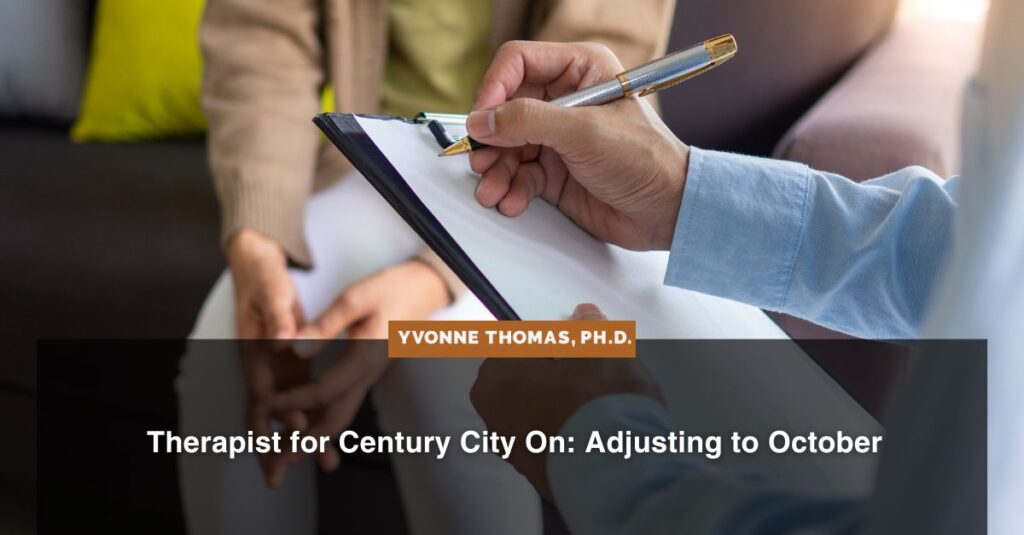October offers something special, even in sunny California—cooler evenings, a gentle rustling of leaves, the long shadows at dusk. But for many, that shift also brings anxieties, sadness, and restlessness. If you’re looking for a compassionate guide through this time, we’re here. As an experienced therapist for Century City, Dr. Thomas can help you understand the emotions October stirs up, spot how they affect you, and take steps—so you gain more control over your mental health now, rather than waiting until things feel overwhelming.
What Changes in October and How It Can Affect Your Emotions
October can bring milder weather and beautiful foliage, but other changes can occur, too:
- Shorter daylight hours. Even in mild climates, the shift from long summer days to shorter light in morning and evening can affect mood, energy, and sleep cycles. It’s similar to what people call Seasonal Affective Disorder (SAD) when symptoms become more than just “feeling blue.”
- Temperature shifts toward chill. Even slight drops in temperature can trigger an internal feeling of coldness—physical and psychological. The contrast with summer can feel stark, especially if you enjoyed being outside a lot.
- Anticipation of winter and holidays. For many, October begins a lead-up: holiday plans, family expectations, financial concerns, or feelings about time passing. There’s a mix of nostalgia and dread.
- Reduced social invitations or outdoor gatherings. As people stay in more, some sense of isolation can creep in. If your support network relies on shared outdoor time or spontaneous meetups, the change in weather can feel like a loss.
How Anxiety, Sadness, or Stress Might Manifest
When October’s changes hit, here’s how it might show up—some obvious, some more subtle:
- Mood dips—feeling more irritable, sad, or unmotivated than usual. Maybe things that once brought joy feel less bright.
- Sleep disturbances: difficulty falling asleep, waking up earlier, or restless nights. Those shorter days can disrupt circadian rhythm.
- Fatigue, low energy. Even if you’re getting rest, you might feel drained. Less sunlight means changes in brain chemistry—serotonin, melatonin, things we don’t always notice until energy levels drop.
- Appetite or weight changes. Some people crave comfort foods, or eat more; others lose appetite. Light exposure (or lack thereof) can play a role.
- Social withdrawal. You may cancel plans more, avoid going out, or feel like staying inside is safer. Those patterns can feed sadness or anxiety, making things worse.
- Worry or rumination. “What if winter is worse than last year?” “What if I’m behind on what I wanted to do this year?” Those future-oriented worries can intensify.

Steps You Can Take Now to Support Your Mental Well-Being
Because it’s easier to prevent deep struggles than to resolve them later, here are proactive steps Dr Thomas encourages clients to try. These won’t all be right for everyone, but they’re little things you can do to help yourself today:
- Get as much natural light as possible during the day. Open blinds, take walks in daylight, even sit by windows; daylight helps regulate mood.
- Keep consistent sleep routines. Go to bed and wake up at the same time. Avoid screens right before bed. Small habits like dimming lights in the evening help signal to your body it’s time to wind down.
- Build a gentle routine or ritual around evenings. Warm teas, soft lighting, reading, journaling, meditating—all these can help calm the transition to darker days.
- Stay connected. Even when it feels harder, reach out to friends, family, or social groups. Sharing how you feel is powerful. Human connection is one of the best defenses against isolation.
- Plan meaningful activities. Maybe fall hikes, cooking seasonal foods, or taking up a hobby you paused. Having things to look forward to gives emotional lift.
- Physical movement. Exercise—even gentle yoga, walking, swimming—helps with mood, energy, and stress. Outdoors is ideal, but indoors works too.
- Monitor nutrition. Try to include whole foods, adequate protein, and limit high-sugar or high-processed foods if they tend to leave you feeling heavier or more lethargic.
- Mindfulness, breathing, grounding practices. These can help when worry or sadness spike unexpectedly. Learn to notice the thoughts, label them (“this is anxiety,” “this is sadness”), and let them pass rather than following them into rumination.
How Therapy Can Help You Weather October and Beyond
Dr. Thomas offers tailored support to help you navigate these challenges, so you don’t have to struggle alone.
- Individual therapy. Dr. Thomas works with clients to spot patterns—thoughts, behaviors, beliefs—that may be deepening the anxiety or sadness caused by seasonal shifts, and develop strategies that feel authentic.
- Couples counseling Century City. If you’re in a partnership, changes in mood, routines, or expectations in October and approaching winter often affect both people. Dr. Thomas helps couples communicate more clearly, support each other, and adjust together.
- Teletherapy. For many, commuting or driving in darker evenings is hard. Dr. Thomas provides remote sessions so you can attend therapy from your home or safe space.
Those are just some of the ways Dr. Thomas can help. There are many, many others.
Support When Seasonal Mood Changes Become More Than Temporary
Sometimes, the shifts are manageable. Other times, they grow more serious. If you notice these signs, therapy is especially important:
- Your mood is low most days for more than two weeks.
- Sleep problems become chronic or you feel exhausted even after a good night.
- You start withdrawing from people or stop doing things you used to care about.
- You experience persistent thoughts of hopelessness, guilt, or worthlessness.
- You notice appetite changes, weight changes, or troubling physical symptoms like headaches or body aches without clear cause.
Schedule a Free Consultation With An Experienced Therapist in Century City Today
Dr. Thomas has found that when folks partner with the right therapist, October doesn’t have to be the beginning of a downward slide—it can be a turning point for growth, awareness, and resilience.
You don’t need to feel stuck with the dread or sadness often associated with October or the end of year shift. If you’re ready to explore what feels behind these emotions, and to build a path forward, reach out. Therapy can make real change when it’s with the right person. You can connect with Dr. Thomas for a free 15 minute conversation—no pressure, just a chance to see if our services feel like a good fit.
